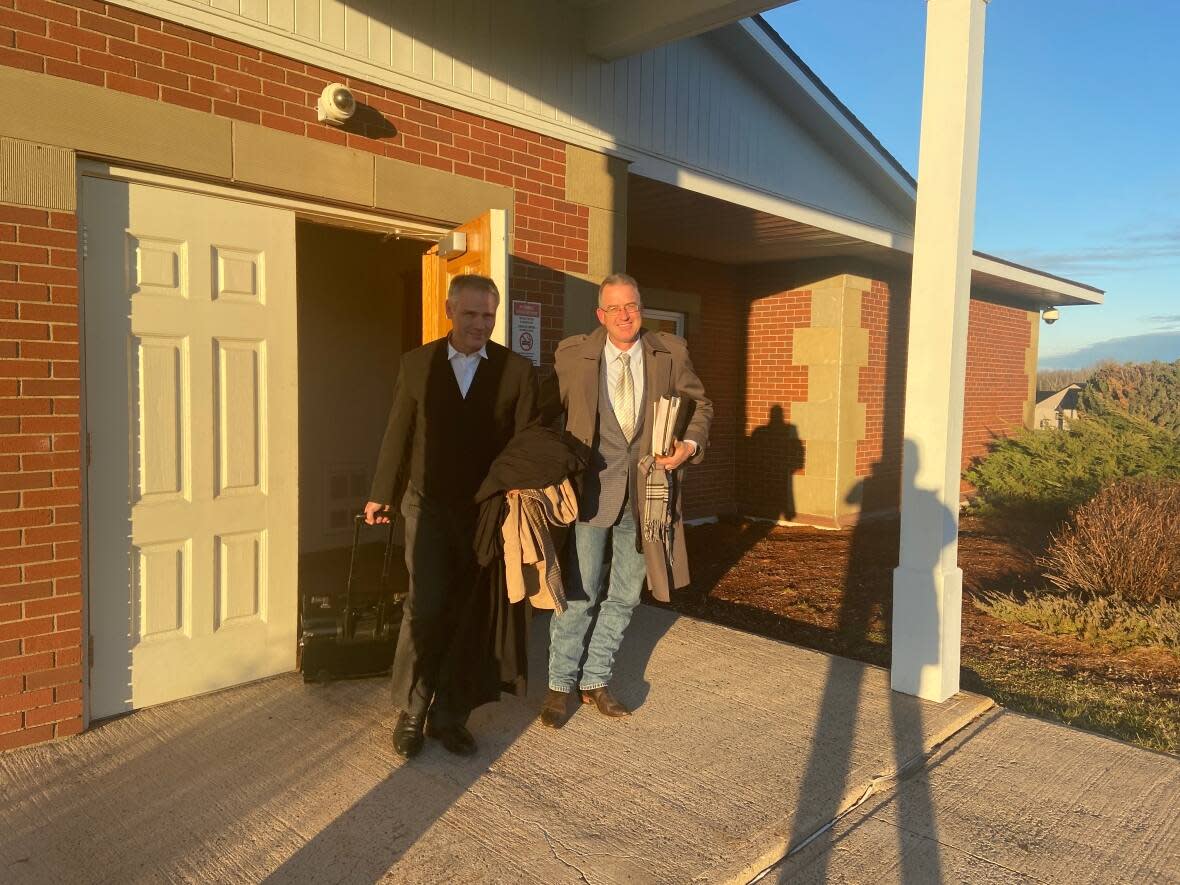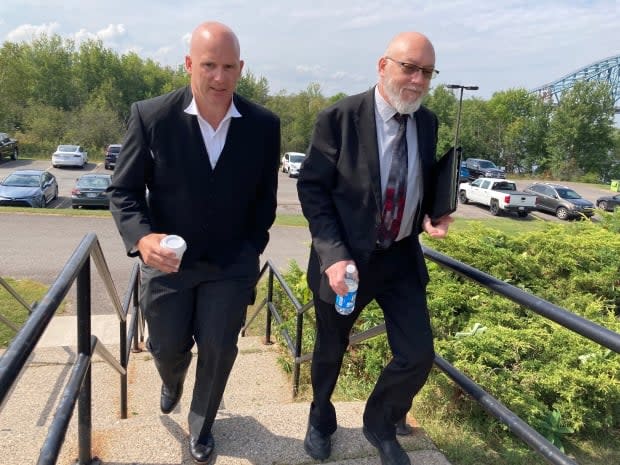Cumberland seeking $300K in damages, court hears, in closing arguments

The judge in Rod Cumberland's wrongful dismissal trial heard closing arguments Friday, with his lawyer standing firm on the allegation Cumberland was fired over his views on glyphosate, and his former employer calling the accusation a "conspiracy theory."
The eight-day trial of Cumberland's wrongful dismissal suit against the Maritime College of Forest Technology wrapped up before New Brunswick Court of King's Bench Chief Justice Tracey DeWare, with final arguments from his lawyer, Paul Champ, and the college's lawyer, Clarence Bennett.
The day began with arguments from Champ, who ran through testimony the court heard from Cumberland himself, former and current college executives and employees, and a former student of his.
Cumberland was an instructor at the college when he was fired in June 2019. Central to his claim of wrongful dismissal was that he was dismissed for his opposition to the use of glyphosate, an herbicide widely used in the New Brunswick forest industry.
Champ referred to the minutes from the college's board of governors meeting from April 2019, in which it was noted that Cumberland had publicly criticized the forestry sector in relation to certain forest management practices.
The trial heard that three months prior to that board meeting, Cumberland acted inappropriately in the way he publicly questioned federal scientists who were presenting at a conference on herbicides and the forestry industry, held in Fredericton.
Cumberland says opinionThe trial heard that a senior J.D. Irving Ltd. employee took issue with Cumberland's comments and complained about them to a college board of governors member, who then contacted college director Tim Marshall.
"That's what it's about," Champ said. "It's about him expressing his opinions.
"'Publicly criticized the forestry sector', J.D. Irving. That's how J.D. Irving obviously interpreted it when he was criticizing the forestry scientists," Champ said.
The college, however, argued that Cumberland's dismissal with cause was the result of complaints from students about him, his resistance to a changing culture at the college, insubordination toward his superiors, and his behaviour leading up to and during the seminars, which took place in January 2019.

"We're here because the plaintiff, an employee of seven years of service is looking for 14 months of notice [in damages] … and $200,000 in damages because of essentially a conspiracy theory," Bennettt said in his closing arguments.
"A conspiracy theory that has been perpetrated by him, as well as by his lawyer, and there's no way around describing it that way."
Champ said Cumberland is seeking $300,000 from the college, which includes pay equalling 14 months of termination notice, as well as aggravated and punitive damages, each equalling $100,000.
After hearing more than three hours of closing arguments from both sides, DeWare said she'd reserve her decision, which can be expected as late as the end of March 2023.
Cumberland claims bad faith
Aside from the allegation that Cumberland was fired for his views on glyphosate, Champ discussed evidence on how senior members at the college dealt with him in the months leading up to his dismissal.
Those members included Gareth Davies, academic chair at the college, who was Cumberland's direct supervisor, as well as Marshall, the college's executive director, who the court heard was implementing changes at the college that Cumberland disagreed with.
Champ recounted how Cumberland, for months starting in fall 2018, was being ignored and improperly dealt with by Davies.

Champ argued that Cumberland repeatedly emailed Davies, asking to meet to settle their differences.
When that went nowhere, Cumberland emailed Marshall looking for help, Champ said.
"What does Mr. Marshall do? He ignores him," Champ said. "He ignores him. He leaves Mr. Cumberland twisting in the breeze."
'Disdain' for the boss
Bennett, in his closing arguments, drew focus to testimony about the relationship Davies and Marshall had with Cumberland, particularly in fall 2018.
The trial heard how Davies was at one time a fellow instructor and colleague of Cumberland's, but in summer 2018, was promoted over Cumberland to take on the newly created role of academic chair, which made him Cumberland's boss.
It was a promotion that the trial heard Cumberland took issue with and later filed an appeal over. It also prompted him to write an email suggesting he was preparing to sue the college over it.
Bennett also pointed to emails showing Cumberland calling into question decisions Davies made after becoming academic chair.
'Anything but respectful'
'Disdain for the "I'm going to suggest to you the emails [from Cumberland] ... are anything but respectful and in fact show Mr. Cumberland showed a complete disdain for Gareth Davies, and was intentionally showing disdain for Mr. Davies," Bennett said.
Bennett also noted how Davies testified that his views on glyphosate were similar to Cumberland's, and that Marshall didn't even know what glyphosate was prior to before becoming the college's director.
"I actually don't think there's anyone who testified who suggested they took issue with Mr. Cumberland's views on glyphosate," Bennett said. "But many discussed his delivery, his judgment.
"The evidence is pretty clear that [Cumberland's] conduct at the seminar was unprofessional."

 Yahoo Movies
Yahoo Movies 
